 Petzlover
PetzloverPerro Cimarron is originated from Uruguay but Pugnaces Britanniae is originated from United Kingdom. Perro Cimarron may grow 14 cm / 5 inches shorter than Pugnaces Britanniae. Perro Cimarron may weigh 65 kg / 143 pounds lesser than Pugnaces Britanniae. Both Perro Cimarron and Pugnaces Britanniae has almost same life span. Perro Cimarron may have less litter size than Pugnaces Britanniae. Both Perro Cimarron and Pugnaces Britanniae requires Low Maintenance.
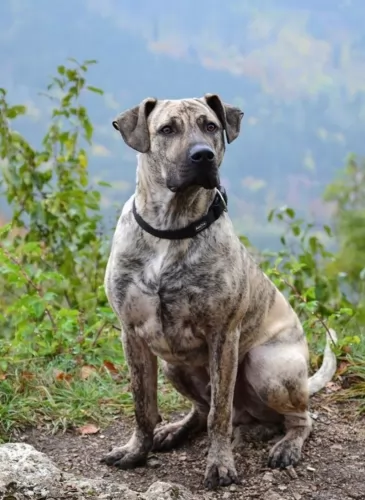 The Perro Cimarron, also known as the Uruguayan Cimarron is a molosser type dog which originated in Uruguay. The dog is believed to have descending from European dogs which were brought to the country by early colonizers.
The Perro Cimarron, also known as the Uruguayan Cimarron is a molosser type dog which originated in Uruguay. The dog is believed to have descending from European dogs which were brought to the country by early colonizers.
These dogs are the official mascot of the National Army of Uruguay. The dog is also recognized in Uruguay as well as by the Federation Cynologique Internationale. The dog was exported to the United States and then recognized by the United Kennel Club in the category Guardian Dog.
Pugnaces Britanniae is a dog which is now extinct. There isn't certainty surrounding the origins of the dog but it is thought they descended from dogs brought to Britain way back in the 6th century BC already.
These are ancient dogs, and when you do research you find references dating back to centuries ago. In fact when you read of the Roman conquest of Britain you read of huge dogs, which the Romans referred to as Pugnaces Britanniae.
It is believed that the English Mastiff descended from the ancient Alaunt and Pugnaces Britanniae and that the dog was used as a war dog.
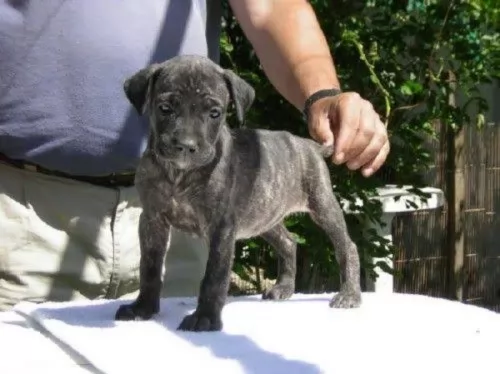 The Perro Cimarron is a large dog standing at between 58 to 61cm and weighing 38 to 45kg, both males and females.
The Perro Cimarron is a large dog standing at between 58 to 61cm and weighing 38 to 45kg, both males and females.
He is a muscular dog with the coat being short and smooth and in a pale fawnish color or brindle and with a black face.
The Uruguayan Cimarron is a multi-purpose working dog but today he is mainly a family companion. This large mastiff type dog is muscular and athletic. He has a large head, the ears are high set and floppy but sometimes they are still cropped and made erect. The tail is thick, low set and reaches to the hock. He has a black nose, brown eyes and a black mask.
Strong, alert, self confident and brave, the Perro Cimarron may not have a particularly friendly face but he loves his human family and is loyal to them. He is calm and cool but even so, he will need to be trained and socialized and then he becomes calm around different people and in different situations. He is a dog that can get on well with children and pets in the home.
The Pugnaces Britanniae was a huge dog standing at roughly 67 to 75cm and weighing 52 to 110kg.
He was a heavily built dog, a Mastiff type dog that had a large head, broad muzzle with fairly loose skin around the mouth, brown eyes, a broad back and rump, muscular legs and floppy ears with a long tail. In fact the Mastiff, thought to have descended from the ancient Alaunt and Pugnaces Britanniae, gives you an idea of what the dog looked like. He no doubt has a short, smooth coat available in fawn, tan or brindle and with the black mask.
The Pugnaces Britannia was a naturally aggressive dog so it is to be expected that he wouldn’t automatically have been a good family dog, possibly being aggressive around children and other dogs. They were intelligent and were no doubt taught some simple commands.
They were also very territorial dogs, wanting to instinctively chase and attack unknown people and animals. They were strong minded, confident, loyal ad loving dogs towards their owners, being protective of them, wanting to please them.
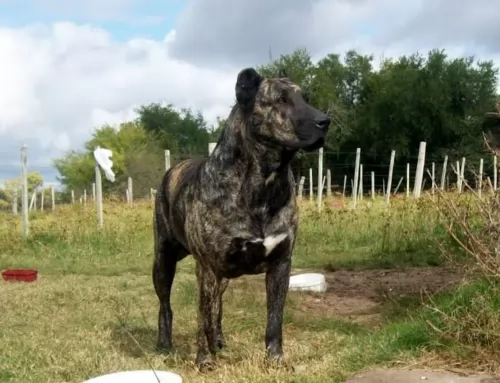 The Uruguayan Cimarron is not looked upon as a pet for the first time dog owner. He is strong willed, stubborn, somewhat aggressive and independent and will require a strong, firm, consistent owner.
The Uruguayan Cimarron is not looked upon as a pet for the first time dog owner. He is strong willed, stubborn, somewhat aggressive and independent and will require a strong, firm, consistent owner.
He will make a loyal, affectionate pet for the person who takes time to socialize and train him. He also makes a good watchdog.
The way any dog breed is brought up will determine how he turns out, and if this particular dog is brought up the right way and given the right amount of care and exercise he needs, he can make as good a pet as any other dog breed.
The Pugnaces Britanniae may well have been a large dog and quite imposing to look at but he was in all likelihood a good-natured pet who got on well with his family members, being loyal and loving if brought up correctly.
Long ago dog training and socialization didn’t exist but a large dog like this would have to be socialized and trained to become obedient and an amicable all-rounder.
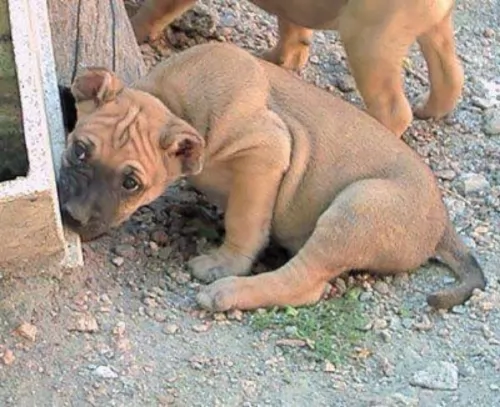 Most dogs, when they are well cared for, don’t get sick often. The Cimarrón is a robust kind of dog but even so he can get any one of the many common dog illnesses there are such as hip dysplasia, bloat, dental disease, cancer, obesity and others.
Most dogs, when they are well cared for, don’t get sick often. The Cimarrón is a robust kind of dog but even so he can get any one of the many common dog illnesses there are such as hip dysplasia, bloat, dental disease, cancer, obesity and others.
This infection can make your dog restless and you will notice your dog trying to wee often but unable to. It can be terrible watching your dog battling, and you will need to get your pet to the vet soon.
Your dog can pick up parasites anywhere such as ticks ad fleas. There are also internal parasites such as tape- and heartworms. They can bring your pet down, making him lethargic and nauseous, so it is best to research canine parasites so you can know what steps to take to protect your dog.
Don’t for one minute think that skin problems are a minor ailment. The pain and itching can drive your dog to despair. The skin can be red, inflamed and oozing. There are so many things that can cause your pet to get a skin allergy and you will need to get him to the vet to get some kind of relief for him.
The Pugnaces Britanniae could live to 10, 11 or 12 years of age with good care. Large Mastiff type dogs like this would have had to watch out for common canine diseases such as hip dysplasia, cancer and bloat.
In those days, no screening tests were available for health problems like this. Gastric dilatation volvulus or bloat is a common health issue with large, deep chested dogs where the stomach fills with gas and the stomach twists. Its a life threatening disease.
Canine heart disease is another serious health issue with these mastiff type dogs. Early stages with heart disease show there may well be no symptoms at all. However, as the heart disease progresses towards congestive heart failure, the dog will have symptoms such as fatigue, difficulty with breathing, weight loss, a distended abdomen and coughing.
A dog with symptoms like this would have to see a vet immediately.
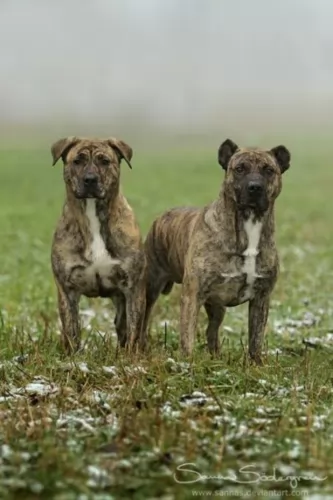 As a high energy, intelligent dog, the Cimarron Uruguayo needs plenty of exercise. He won’t be content to sit around and will be frustrated and even destructive if he doesn’t receive lots of attention and exercise. Daily walks will be imperative as well as other forms of physical and mental stimulation.
As a high energy, intelligent dog, the Cimarron Uruguayo needs plenty of exercise. He won’t be content to sit around and will be frustrated and even destructive if he doesn’t receive lots of attention and exercise. Daily walks will be imperative as well as other forms of physical and mental stimulation.
Your Uruguayan Cimarron is a low maintenance dog because of the short coat which will still require brushing twice a week as he does shed quite a bit. Other forms of grooming include nail clipping, checking the ears and teeth as both of these can become seriously infected if not checked and attended to.
If you have a Uruguayan Cimarron dog as a pet, you will need to be looking at the best food for him as he is large and energetic. There are some excellent commercially manufactured dog foods on the market and you want to be sure that you read the ingredients list so that the food can benefit your pet.
It’s never a good idea to just go on and on feeding your pet kibble. A break every now and again can do your pet the world of good. Some home-made food such as boiled chicken, brown rice or pasta and some cooked vegetables such as sweet potato, carrots and spinach will delight your dog when added into his kibble occasionally. He loves the tasty simplicity of such a diet and will never have to worry about digestive problems.
For such a dog, some raw meat added in from time to time will also do him good. Make sure he always has access to fresh, cool water.
The diets of ancient dogs were different to what they are today, as in those days there were no commercially manufactured dog foods. Dog owners in all likelihood tossed scraps to them which included starch.
Today a large dog such as the extinct Pugnaces Britannia would have no doubt been fed a high quality kibble from a leading brand and packed with minerals and vitamins specially formulated for a large dog breed.
Homemade food is also important, but not any kind of food – it has to be food which doesn’t upset the dog’s digestive system. Simple but nutritious food such as boiled chicken, brown rice or pasta, sweet potatoes, carrots and spinach is ideal for a dog, and when it is chopped up can be added twice a week to the dry kibble for a tasty, healthy treat.
Raw meat added in occasionally is also hugely beneficial. No dog should ever be without fresh, cool water constantly available.
As a short haired dog, the Pugnaces Britanniae would have required a brushing twice a week to rid the dog of loose hairs. Maybe in those days they didn’t check their dogs over to see that all was well, but today you would need to check the inside of the ears. If the insides were red, it could be a sign of an ear infection brought on by dampness, excess wax and dirt.
The eyes would need to be checked for discharge and the teeth checked a well. One rotten tooth can cause a lot of havoc. The nails of the dog would have had to be checked and clipped as well.
As a war dog, the Pugnaces Britanniae would have been fit. He is a big dog and while they require exercise such as walks and hide-and-seek type of games, he isn’t the kind of dog that would go running with you on a jog, as large, heavy dogs can overheat easily.